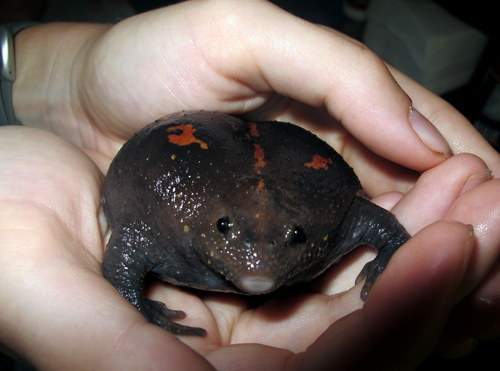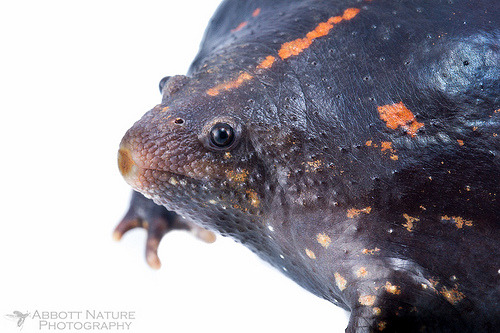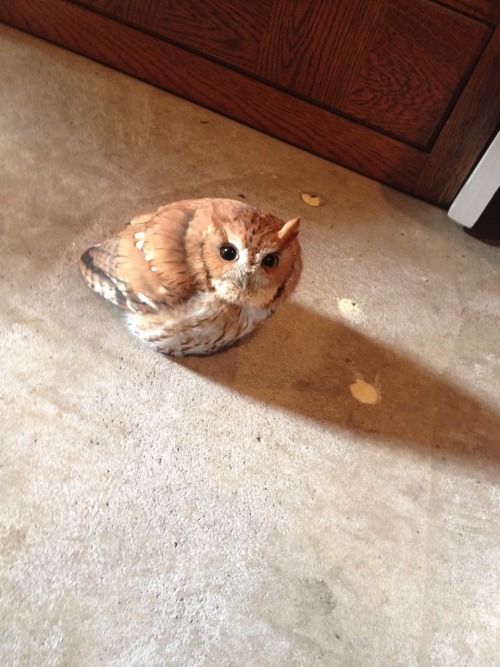This Squid, Taonis Borealis, Is One Of The Many Interesting Deep-sea Organisms MBARI’s Midwater Ecology

This squid, Taonis borealis, is one of the many interesting deep-sea organisms MBARI’s Midwater Ecology group observed on their research expedition in October 2012. You can learn more about their research and see more of the interesting animals they found by reading the group's cruise logs.
More Posts from Llamaslikesciencetoo and Others




BILL BILL BILL BILL
friend of the day!
you’ve met handsome roundboy, now we introducing….
His Royal Flatness, mexican burrowing toad!

SO FLAT! i am swooning

a face of a king

perfect is he body

i trust him

I love him

beautiful smile of toad

he know you love him too!

in he come for a kiss!

thank you goodbye!!
While many of the reconstructions leave something to be desired (so many wings that end, inexplicably, at the wrists?!!) the mission of this exhibit - and the ultimate message - is top notch.



This new procedure is making it a little bit easier to deal with cancer treatment
Cancer patients who are undergoing chemo no longer have to suffer hair loss. A new cooling treatment, called the Dignicap, is placed on the head during chemo and protects the hair follicle by reducing blood flow. The process can be expensive, sometimes up to $600, but so far it’s been very effective and has helped cancer patients feel a little more comfortable throughout their treatment.
Earth Expeditions Preview
A Closer Look at Our Home Planet

Our view from space shows our planet is changing, but to really understand the details of these changes and what they mean for our future, scientists need a closer look. Over the next six months, we’re taking you on a world tour as we kick off major new field research campaigns to study regions of critical change from land, sea and air.
You can follow the Earth Expeditions on Facebook, Twitter and their Blog.
Take a look at the eight campaigns we will explore:
CORAL (Coral Reef Airborne Laboratory)

This three-year CORAL mission will use advanced airborne instruments and in-water measurements to survey a portion of the world’s coral reefs. The mission will assess the conditions of these threatened ecosystems to better understand their relation to the environment, including physical, chemical and human factors. With a new understanding of reef condition, the future of this global ecosystem can be predicted.
OMG (Oceans Melting Greenland)

Oceans Melting Greenland (OMG) mission will pave the way for improved estimates of sea level rise by addressing the question: To what extent are the oceans melting Greenland’s ice from below? This mission will observe changing water temperatures and glaciers that reach the ocean around all of Greenland from 2015 to 2020. This year, the OMG mission will fly over the periphery of Greenland to take measurements of the heights and extents of Greenland’s coastal glaciers that reach the ocean and release expendable sensors to measure the temperature and salinity of coastal waters. The OMG field campaign will gather data that will help scientists both understand how the oceans are joining with the atmosphere in melting the vast ice sheet and to predict the extent and timing of the resulting sea level rise.
NAAMES (North Atlantic Aerosols and Marine Ecosystems Study)

About half the carbon dioxide emitted into Earth’s atmosphere each year ends up in the ocean, and plankton absorb a lot of it. The NAAMES mission studies the world’s largest plankton bloom and how it gives rise to small organic particles that leave the ocean and end up in the atmosphere, ultimately influencing clouds and climate. This mission will be taking measurements from both ship and aircraft in the North Atlantic.
KORUS-AQ (Korea U.S.-Air Quality)

Air quality is a significant environmental concern around the world. Scientists are developing new ways to untangle the different factors that contribute to poor air quality. KORUS-AQ is a joint field study between NASA and the Republic of Korea to advance the ability to monitor air pollution from space. The campaign will assess air quality across urban, rural and coastal South Korea using observations from aircraft, ground sites, ships and satellites to test air quality models and remote sensing methods. Findings from this study will help develop observing systems using models and data to improve air quality assessments for decision makers.
ABoVE (Arctic Boreal Vulnerability Experiment)

The ABoVE mission covers 2.5 million square miles of tundra, forests, permafrost and lakes in Alaska and Northwestern Canada. Scientists from the mission are using satellites and aircraft to study this formidable terrain as it changes in a warming climate. Teams of researchers will also go out into the field to gather additional data. The mission will investigate questions about the role of climate in wildfires, thawing permafrost, wildlife migration habits, insect outbreaks and more.
ATom (Atmospheric Tomography)

The ATom mission takes flight through Earth’s atmosphere to understand how short-lived greenhouse gases like ozone and methane contribute to climate change. In late July through August 2016, a suite of instruments aboard our DC-8 flying laboratory will be hopping down the Pacific Ocean from Alaska to the southern tip of South America. It will then travel north up the Atlantic to Greenland to measure more than 200 gases and particles in the air and their interactions all around the world.
ORACLES (Observations of Clouds above Aerosols and their Interactions)

Southern Africa produces almost a third of the world’s vegetative burning, which sends smoke particles up into the atmosphere, where they eventually mix with stratocumulus clouds over the southeastern Atlantic Ocean. Little is known about how these particles impact the clouds, which play a key role in both regional and global surface temperatures and precipitation. The ORACLES mission is a five-year ground and air campaign aimed at better understanding their interactions and improve on current climate models.
ACT-America (Atmospheric Carbon and Transport – America)

The ACT-America mission will conduct five airborne campaigns across three regions in the eastern United States to study the transport of atmospheric carbon. This region serves as an ideal study area for its productive biosphere, agricultural activity, gas and oil extraction and consumption, dynamic seasonally varying weather patterns and the most extensive carbon cycle and meteorological observing networks on Earth. Using space borne, airborne and ground-based measurements, this mission will enable more accurate and precise estimates for climate management and prediction by studying sources and sinks of greenhouse gases, which act as a thermal blanket for Earth.
Remember to follow the Earth Expeditions on Facebook, Twitter and their Blog.
Make sure to follow us on Tumblr for your regular dose of space: http://nasa.tumblr.com




Photos of orcas underwater near Bremer Canyon, Australia.





Found this on my social media… It’s time for Australians to respect sharks as sentient creatures that can contribute to GDP as shark tourism that does not include hooking, netting or sport and trophy fishing. The Bahamas has done this and together with Ocean Ramsey (pictured with great white shark) I have experienced first hand what it means to Bahamians to have their sharks bring valued income for local businesses whether they love, hate or remain fearful of sharks. The animals pictured in the catch and release photos that went viral are likely to have been killed soon after release by healthier sharks in the area. As sentient sharks for human-shark interaction, both sharks pictured could generate over $5 million for a charter operator. That does not include accommodation, dining, car hire and regional products and services for coastal communities that defy the existing JAWS affected paradigm and do as The Bahamas has done for tigers, hammerheads, bull sharks, Caribbean reefies, nurses and all shark species in their territorial waters. Be a champion for sharks and flag your disapproval of angling trips of this kind. If these guys really have what it takes to be heroes, have them join me and Ocean Ramsey for a photo with creatures acting naturally in their company in their element. Unfortunately we would need to do this in Hawaii, Mexico, Florida or The Bahamas for the fact that there is no place that I know of in Australia to do this in 2016.


It’s a cute little thing though.

It’s been years since I first learned about it and I still can’t get over the fuckin fact that box jellyfish have EYES. JELLYFISH WITH EYES. THIS JELLYFISH IS LOOKING AT YOU. THE THINGS THAT LOOK LIKE EYES ARE ITS EYES. IT HAS THEM. A JELLYFISH.

A comic about the different joints in the body
This piece was first posted on Doodlebook.org
-
 bikerwizard4ever liked this · 1 year ago
bikerwizard4ever liked this · 1 year ago -
 oceanblue971 reblogged this · 4 years ago
oceanblue971 reblogged this · 4 years ago -
 dimens1ons liked this · 4 years ago
dimens1ons liked this · 4 years ago -
 mlleclaudine reblogged this · 5 years ago
mlleclaudine reblogged this · 5 years ago -
 mlleclaudine liked this · 5 years ago
mlleclaudine liked this · 5 years ago -
 the13thgrey-blog liked this · 6 years ago
the13thgrey-blog liked this · 6 years ago -
 sweetteascience reblogged this · 6 years ago
sweetteascience reblogged this · 6 years ago -
 sixappleseeds liked this · 6 years ago
sixappleseeds liked this · 6 years ago -
 lovelyenbie liked this · 6 years ago
lovelyenbie liked this · 6 years ago -
 sweetteascience reblogged this · 6 years ago
sweetteascience reblogged this · 6 years ago -
 modelwarren liked this · 7 years ago
modelwarren liked this · 7 years ago -
 elderrskelterr reblogged this · 9 years ago
elderrskelterr reblogged this · 9 years ago -
 scheming-pangolin reblogged this · 9 years ago
scheming-pangolin reblogged this · 9 years ago -
 sidhehound reblogged this · 9 years ago
sidhehound reblogged this · 9 years ago -
 berserk-al liked this · 9 years ago
berserk-al liked this · 9 years ago -
 orbiculator liked this · 9 years ago
orbiculator liked this · 9 years ago -
 cavalaxis liked this · 9 years ago
cavalaxis liked this · 9 years ago -
 kvarenje reblogged this · 9 years ago
kvarenje reblogged this · 9 years ago -
 aquinogabriela liked this · 9 years ago
aquinogabriela liked this · 9 years ago -
 thelivingdesert liked this · 9 years ago
thelivingdesert liked this · 9 years ago -
 pansyborg reblogged this · 9 years ago
pansyborg reblogged this · 9 years ago -
 hi-ya1 liked this · 9 years ago
hi-ya1 liked this · 9 years ago -
 6purplescissors reblogged this · 9 years ago
6purplescissors reblogged this · 9 years ago -
 6purplescissors liked this · 9 years ago
6purplescissors liked this · 9 years ago -
 viearbre liked this · 9 years ago
viearbre liked this · 9 years ago -
 randomsignal-blog reblogged this · 9 years ago
randomsignal-blog reblogged this · 9 years ago -
 randomsignal-blog liked this · 9 years ago
randomsignal-blog liked this · 9 years ago -
 elderrskelterr liked this · 9 years ago
elderrskelterr liked this · 9 years ago -
 rjzimmerman reblogged this · 9 years ago
rjzimmerman reblogged this · 9 years ago -
 llamaslikesciencetoo reblogged this · 9 years ago
llamaslikesciencetoo reblogged this · 9 years ago -
 llamafollower liked this · 9 years ago
llamafollower liked this · 9 years ago -
 mermithid reblogged this · 9 years ago
mermithid reblogged this · 9 years ago -
 kinggoricethexiiofwitchland reblogged this · 9 years ago
kinggoricethexiiofwitchland reblogged this · 9 years ago -
 casuallyjollybird liked this · 9 years ago
casuallyjollybird liked this · 9 years ago -
 kinggoricethexiiofwitchland liked this · 9 years ago
kinggoricethexiiofwitchland liked this · 9 years ago -
 casuallyjollybird reblogged this · 9 years ago
casuallyjollybird reblogged this · 9 years ago -
 khrysdiebee liked this · 9 years ago
khrysdiebee liked this · 9 years ago -
 opakakaek reblogged this · 9 years ago
opakakaek reblogged this · 9 years ago -
 wrdhat liked this · 9 years ago
wrdhat liked this · 9 years ago -
 wrdhat reblogged this · 9 years ago
wrdhat reblogged this · 9 years ago -
 cobrakai78 liked this · 9 years ago
cobrakai78 liked this · 9 years ago -
 justaquickquestion liked this · 9 years ago
justaquickquestion liked this · 9 years ago -
 weredrakka liked this · 9 years ago
weredrakka liked this · 9 years ago
Mainly interested in ecology, but also the entirety of science.
179 posts